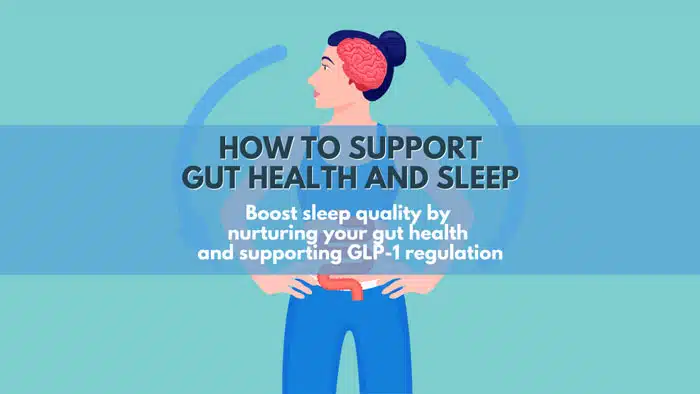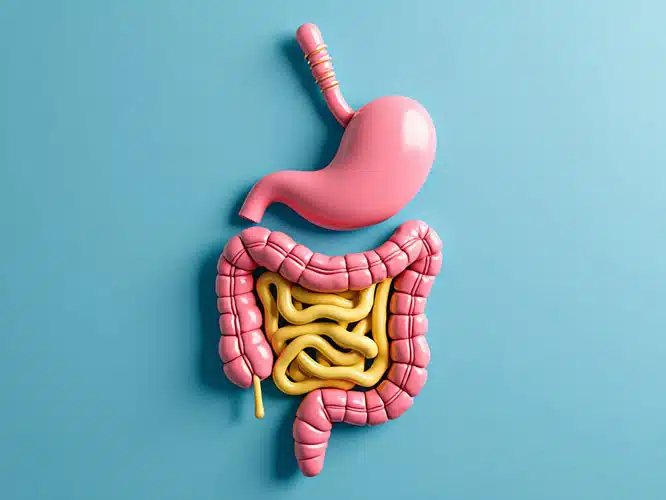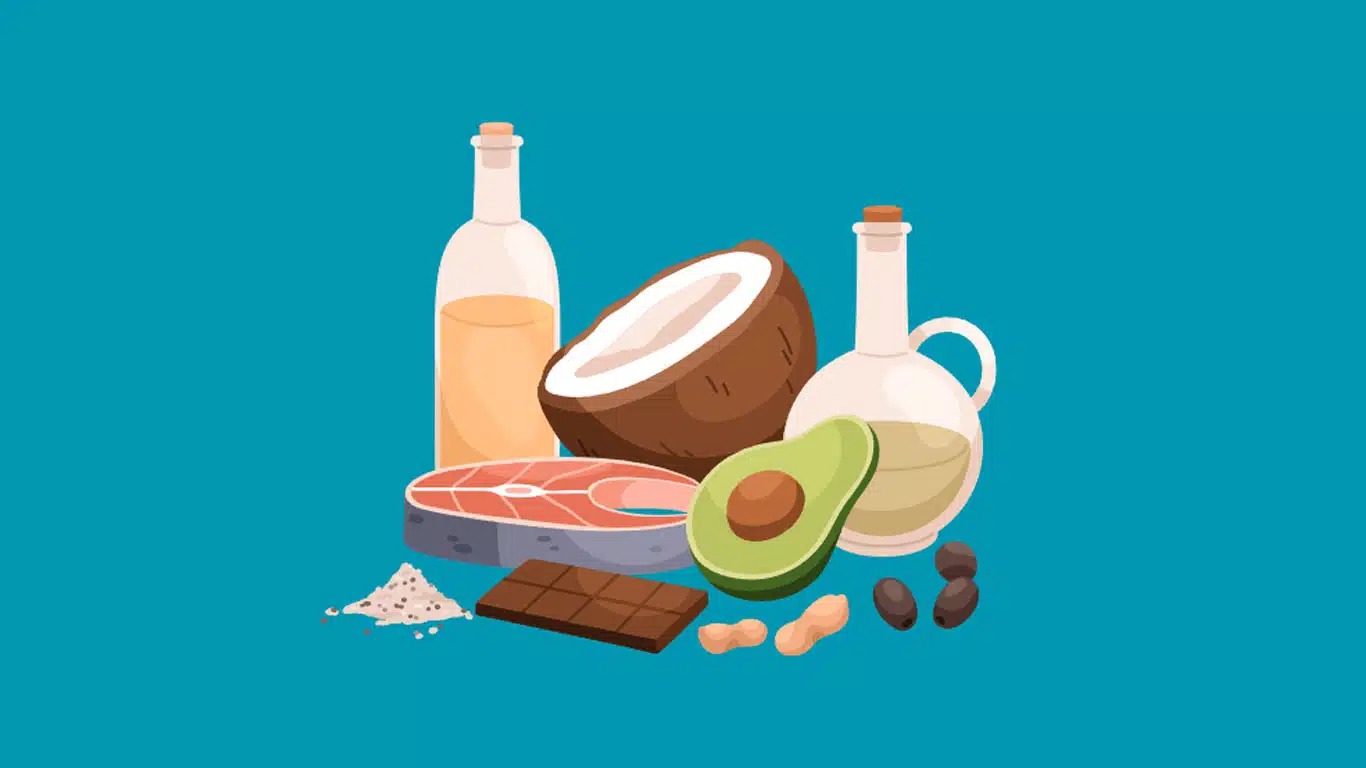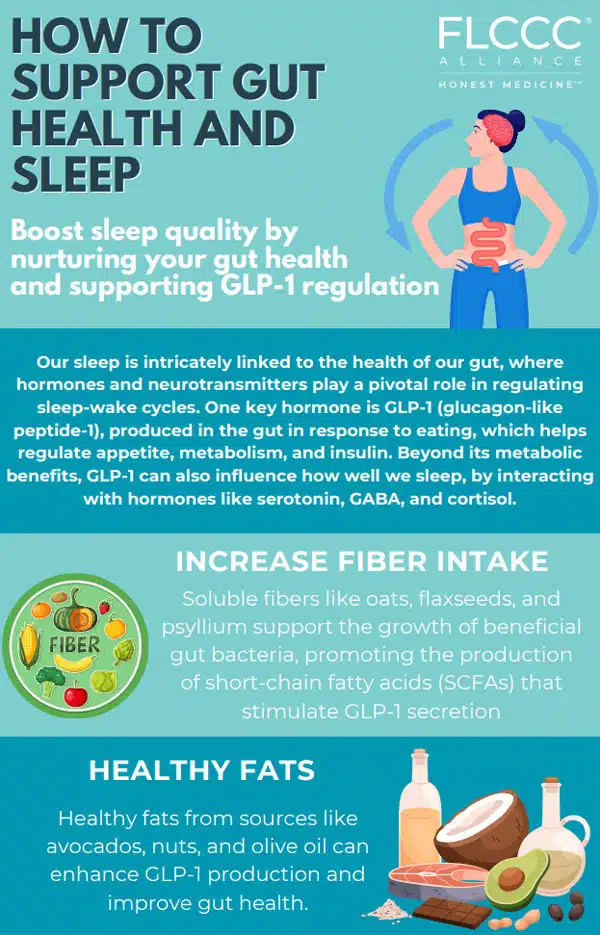Discover how the gut microbiome impacts sleep patterns and overall health. Learn about the connection between gut bacteria, sleep quality, and tips for better gut health.

Post by Dr. Kristina Carman, ND, NT, IFM
FLCCC Senior Fellow, Nutritional and Holistic Health
In the quest for optimal health, the importance of sleep cannot be overstated. We all know the consequences of a poor night’s rest: fatigue, mood swings, brain fog, and often, a ravenous appetite for junk food. But what’s really going on behind the scenes? Our bodies orchestrate an intricate symphony of hormones and neurotransmitters, each playing a crucial role in ensuring we fall asleep, stay asleep, and wake up feeling refreshed. Interestingly, a key player in this delicate balance is the gut—the gut microbiome, to be precise!
This article explores how sleep-regulating hormones and neurotransmitters interact with gut health and affect sleep, especially focusing on the emerging role of GLP-1 (glucagon-like peptide-1), a hormone produced in the gut with far-reaching effects on both metabolism and sleep.
The Hormones and Neurotransmitters That Regulate Sleep and Affect Gut Health
Before we dive into how gut health influences sleep, let’s first look at the key hormones and neurotransmitters responsible for maintaining a healthy sleep-wake cycle.
- Melatonin
- Cortisol
- Serotonin
- GABA
- Adenosine
- Orexin
- Leptin and Ghrelin
1. Melatonin
- What it does: Melatonin is the primary sleep hormone, produced by the pineal gland in response to darkness. Its release signals the body that it’s time to wind down, lowering body temperature and inducing drowsiness.
- Sleep connection: Melatonin sets the internal clock, telling your body when it’s time to sleep and wake up. Without it, or if it’s disrupted by factors like excessive blue light, sleep quality becomes poor, and sleep becomes fragmented.
2. Cortisol
- What it does: Cortisol is often known as the “stress hormone” and follows a daily rhythm. Levels are highest in the morning to promote wakefulness and drop in the evening to allow for restful sleep.
- Sleep connection: If cortisol remains elevated due to chronic stress or disrupted circadian rhythms, it can prevent the relaxation needed for sleep. This imbalance often leads to insomnia or waking up in the middle of the night, contributing to poor sleep.
3. Serotonin
- What it does: Serotonin, often referred to as the “feel-good” neurotransmitter, is involved in mood regulation and is also a precursor to melatonin.
- Sleep connection: Adequate serotonin levels are essential for melatonin production. Low serotonin, often linked to depression, can disrupt the sleep-wake cycle, making it difficult to fall asleep or stay asleep.
4. GABA (Gamma-Aminobutyric Acid)
- What it does: GABA is the brain’s primary inhibitory neurotransmitter, reducing neuronal excitability and promoting calmness.
- Sleep connection: GABA helps quiet the brain and body, preparing you for sleep. A deficiency in GABA can lead to racing thoughts and an inability to fully relax, both of which contribute to sleep problems like insomnia.
5. Adenosine
- What it does: Adenosine builds up in the brain throughout the day as a byproduct of cellular energy use, creating “sleep pressure” that makes you feel drowsy by bedtime.
- Sleep connection: The more adenosine accumulates, the sleepier you feel. It’s a key part of your body’s natural drive for sleep. Caffeine works by blocking adenosine receptors, delaying the onset of sleep.
6. Orexin (Hypocretin)
- What it does: Orexin is a neurotransmitter that regulates wakefulness and appetite.
- Sleep connection: High levels of orexin keep you awake, while low levels allow sleep to happen. Dysfunction in this system is linked to disorders like narcolepsy, where people may fall asleep suddenly during the day.
7. Leptin and Ghrelin
- What they do: Leptin suppresses appetite, while ghrelin stimulates hunger.
- Sleep connection: Lack of sleep disrupts the balance between leptin and ghrelin, leading to increased hunger and cravings (often for high-calorie foods), which further disrupts metabolism and energy levels, perpetuating a cycle of poor sleep.

The Role of the Gut Microbiome in Sleep and Hormonal Balance
The gut is often referred to as the body’s “second brain,” and for good reason. The vast network of microbes that live in the gut, known as the gut microbiome, interacts with the central nervous system via the gut-brain axis—a communication network that impacts mood, metabolism, and sleep.
1. The Gut and Serotonin
About 90% of serotonin is produced in the gut. Gut bacteria, particularly Bifidobacterium and Lactobacillus, are involved in synthesizing tryptophan, a precursor to serotonin. Without a healthy gut microbiome, serotonin production may be impaired, affecting melatonin synthesis and sleep quality.
2. The Gut and GABA
Certain gut bacteria, like Lactobacillus rhamnosus, produce GABA, the neurotransmitter that calms the nervous system and prepares the body for sleep. If these bacteria are in short supply, GABA production can drop, making it harder to relax and fall asleep.
3. The Gut and Cortisol
The gut microbiome influences the hypothalamic-pituitary-adrenal (HPA) axis, which regulates cortisol secretion. Disruptions in the gut, such as dysbiosis (an imbalance of gut bacteria), can lead to overactivation of the HPA axis, causing elevated cortisol levels and sleep disturbances.
Introducing GLP-1: The Gut Hormone That Affects Sleep and Gut Health
Now that we’ve covered the gut-brain connection, let’s dive into the emerging role of GLP-1 (glucagon-like peptide-1), a hormone produced in the gut that is gaining attention for its powerful effects on metabolism, satiety, and potentially, sleep.
What is GLP-1?
GLP-1 is secreted by intestinal L-cells in response to eating, particularly in the presence of carbohydrates and fats. Its primary role is to stimulate insulin secretion, inhibit glucagon release, slow gastric emptying, and promote satiety. This hormone is now a key target in the treatment of type 2 diabetes and obesity due to its ability to regulate blood sugar and reduce appetite.
GLP-1 and Sleep
Recent research suggests that GLP-1 may have a circadian rhythm of its own, peaking after meals and possibly influencing sleep-wake cycles through its metabolic effects. As GLP-1 regulates energy balance, insulin sensitivity, and hunger hormones (leptin and ghrelin), it may help create a more balanced metabolic environment that supports restful sleep and improves sleep quality.
How GLP-1 Interacts with Sleep Hormones and Neurotransmitters
1. GLP-1 and Cortisol
GLP-1 has been shown to reduce cortisol levels and dampen the stress response. By promoting a lower cortisol state, especially in the evening, GLP-1 may help reduce stress-related insomnia and sleep disturbances, promoting relaxation.
2. GLP-1 and Serotonin
The gut-brain axis, through which GLP-1 operates, also affects serotonin production. Since serotonin is a precursor to melatonin, any improvement in GLP-1 function may enhance serotonin levels, leading to better sleep.
3. GLP-1 and GABA
There is evidence that GLP-1 enhances GABAergic signaling, promoting relaxation and helping individuals fall asleep more easily.
4. GLP-1 and Leptin/Ghrelin
GLP-1 directly influences leptin and ghrelin. By enhancing leptin sensitivity and inhibiting ghrelin, GLP-1 helps regulate hunger and satiety, reducing late-night cravings that could disrupt sleep.

The Gut Microbiome’s Role in GLP-1 Production
Certain types of bacteria in the gut microbiome, especially those that produce short-chain fatty acids (SCFAs) like butyrate, play a critical role in stimulating GLP-1 secretion. SCFAs are produced when beneficial bacteria ferment dietary fiber in the colon. Microbes like Faecalibacterium prausnitzii and Akkermansia muciniphila are known to enhance GLP-1 production by supporting gut barrier integrity and reducing inflammation.
Maintaining a healthy gut microbiome is crucial for optimal GLP-1 levels, which, in turn, can influence sleep and metabolism.
How Lack of Sleep Can Affect Gut Health
Lack of sleep doesn’t just leave you feeling tired; it can negatively impact your gut health. Sleep deprivation has been shown to alter the composition of the gut microbiota, leading to decreased microbial diversity and an increase in harmful bacteria. This shift can affect the production of essential neurotransmitters and hormones, including GLP-1, serotonin, and GABA, further disrupting sleep patterns and overall health.
How to Support the Gut and GLP-1 Pathways for Better Sleep
1. Increase Dietary Fiber
Soluble fibers, which act as prebiotics found in plant foods like oats, flaxseeds, and psyllium, feed beneficial bacteria that enhance neurotransmitter and hormone production. Eating a diet rich in fiber can improve gut health and sleep quality.
2. Eat Healthy Fats
Incorporating omega-3-rich foods like salmon, flaxseeds, and walnuts can boost GLP-1 levels and support a healthy gut. These fats are found in foods that also reduce inflammation and promote better sleep.
3. Fermented Foods
Probiotic foods like sauerkraut, kimchi, and kefir introduce beneficial bacteria to the gut, improving serotonin, GABA, and GLP-1 production. This can help improve sleep and support overall health.
4. Limit Sugar and Processed Foods
These foods disrupt the gut microbiome and hinder the production of GLP-1 and other beneficial hormones. Reducing intake can help maintain a healthy gut and better sleep patterns.
5. Probiotics and Prebiotics
Taking high-quality probiotics that contain Lactobacillus and Bifidobacterium species can support serotonin and GABA production while helping balance gut flora. Prebiotics like inulin and partially hydrolyzed guar gum (PHGG) serve as food for beneficial bacteria, promoting the production of SCFAs that stimulate GLP-1 secretion.
6. Exercise Regularly
Physical activity, especially aerobic exercise and high-intensity interval training (HIIT), has been shown to naturally boost GLP-1 levels and improve insulin sensitivity. Exercise also promotes a diverse gut microbiome, which enhances serotonin and GABA production, positively influencing sleep.
7. Prioritize Sleep Hygiene
Adequate and consistent sleep is essential for maintaining healthy gut bacteria and supporting GLP-1 regulation. Good sleep hygiene practices, such as maintaining a regular sleep schedule, creating a cool and dark sleep environment, and limiting screen time before bed, will help maintain balance in sleep hormones and gut health.
8. Intermittent Fasting
Time-restricted eating, a form of intermittent fasting, has been shown to improve GLP-1 sensitivity and production. Fasting periods allow the gut to reset, improving insulin sensitivity and aligning with circadian rhythms to promote better sleep.
9. Polyphenols
Foods rich in polyphenols, such as green tea, dark chocolate, berries, and olive oil, have been shown to support the growth of beneficial gut bacteria that promote GLP-1 production and help reduce inflammation. Polyphenols also contribute to better sleep quality by supporting the gut-brain axis and reducing oxidative stress.

Can Gut Health Affect Your Sleep?
Absolutely. Gut health and sleep are closely interconnected through the gut-brain axis. An unhealthy gut can lead to the overproduction or underproduction of neurotransmitters and hormones that regulate sleep, such as serotonin, GABA, and GLP-1. This imbalance can result in sleep problems like insomnia or poor sleep quality.
Signs Your Gut Is Becoming Unhealthy
- Digestive issues like gas, bloating, constipation, or diarrhea
- Sleep disturbances such as insomnia or fragmented sleep
- Mood swings or feelings of anxiety and depression
- Food intolerances or allergies
- Skin problems like eczema or acne
- Frequent infections due to a weakened immune system
How to Fix an Unhealthy Gut
- Consume a balanced diet rich in fiber, prebiotics, and probiotics
- Limit sugar and processed foods that disrupt gut flora
- Stay hydrated to support digestion and nutrient absorption
- Exercise regularly to promote microbial diversity
- Get enough sleep to allow the gut time to repair and regenerate
- Manage stress through mindfulness, meditation, or yoga
The Microbiome and Sleep: The Bigger Picture
The gut’s influence on sleep goes beyond individual hormones like GLP-1. The gut microbiome as a whole plays a critical role in regulating immune responses, inflammation, and even cognitive function, all of which affect how well we sleep.
Gut Inflammation and Sleep Disruption
Gut dysbiosis, or an imbalance in gut bacteria, can lead to systemic inflammation. Chronic inflammation negatively impacts sleep quality by increasing levels of stress hormones like cortisol and reducing melatonin production. Keeping inflammation in check through a balanced microbiome is key to restoring healthy sleep patterns.
Butyrate-Producing Bacteria
Bacteria like Faecalibacterium prausnitzii and Roseburia produce butyrate, a short-chain fatty acid that supports gut health and has anti-inflammatory effects. Butyrate has been shown to have neuroprotective effects and may help regulate circadian rhythms by reducing inflammation in the brain and supporting a healthy gut lining. By fostering these bacteria, we can indirectly improve sleep.
The Gut-Brain Axis and Sleep Cycles
The gut-brain axis is the communication pathway between the gut and the central nervous system. A healthy gut can send calming signals to the brain, promoting the production of neurotransmitters like serotonin and GABA, which help regulate the sleep-wake cycle. On the flip side, a disrupted microbiome can increase stress signals that exacerbate sleep disorders like insomnia.
Gut Microbes and Mood
Poor sleep is often linked to anxiety and depression, both of which are modulated by the gut. Gut bacteria influence the production of neurotransmitters that regulate mood, such as serotonin, dopamine, and GABA. By nurturing a healthy gut microbiome, you can create a more balanced mental state, making restful sleep more attainable.

Recent Studies Linking Gut Health and Sleep
A new study published in the Journal of Nutrition found that increased microbiome diversity is correlated with longer sleep times and better sleep efficiency. Researchers collected fecal samples to analyze the gut microbiota and found that participants with a more diverse gut microbiome not only had longer sleep times but also had better sleep efficiency. This study shows the significant role the gut plays in sleep regulation.
And, another study found that lack of sleep can affect the gut microbiome, leading to changes in the types of bacteria present. These changes can, in turn, affect sleep patterns, creating a vicious cycle of sleep deprivation and poor gut health.
Final Thoughts: Holistic Sleep Health Starts in the Gut
Sleep is a complex process influenced by multiple systems in the body, and as we’ve seen, the gut plays an integral role in regulating the hormones and neurotransmitters that govern sleep. From melatonin and cortisol to GLP-1, serotonin, and GABA, the connection between gut health and sleep is undeniable.
Though, by adopting dietary and lifestyle strategies that support a healthy gut microbiome—such as increasing fiber intake, consuming fermented foods, exercising, and ensuring consistent sleep hygiene—you can positively influence your sleep quality and overall health.
Key Takeaways for Gut-Supported Sleep Health
- Prioritize a fiber-rich diet with plenty of prebiotic foods to feed beneficial bacteria that enhance neurotransmitter and hormone production.
- Incorporate fermented foods or probiotic supplements to boost beneficial gut flora and improve serotonin and GABA levels.
- Focus on exercise and intermittent fasting to support GLP-1 production, which can help regulate both metabolism and sleep.
- Address gut inflammation by including anti-inflammatory foods and supplements, and avoid processed, high-sugar foods that disrupt the gut.
- Maintain good sleep hygiene and regular sleep patterns to ensure your gut and circadian rhythm remain in sync.
When you support your gut, you support your entire body, creating the foundation for better sleep, mood, metabolism, and overall health.






